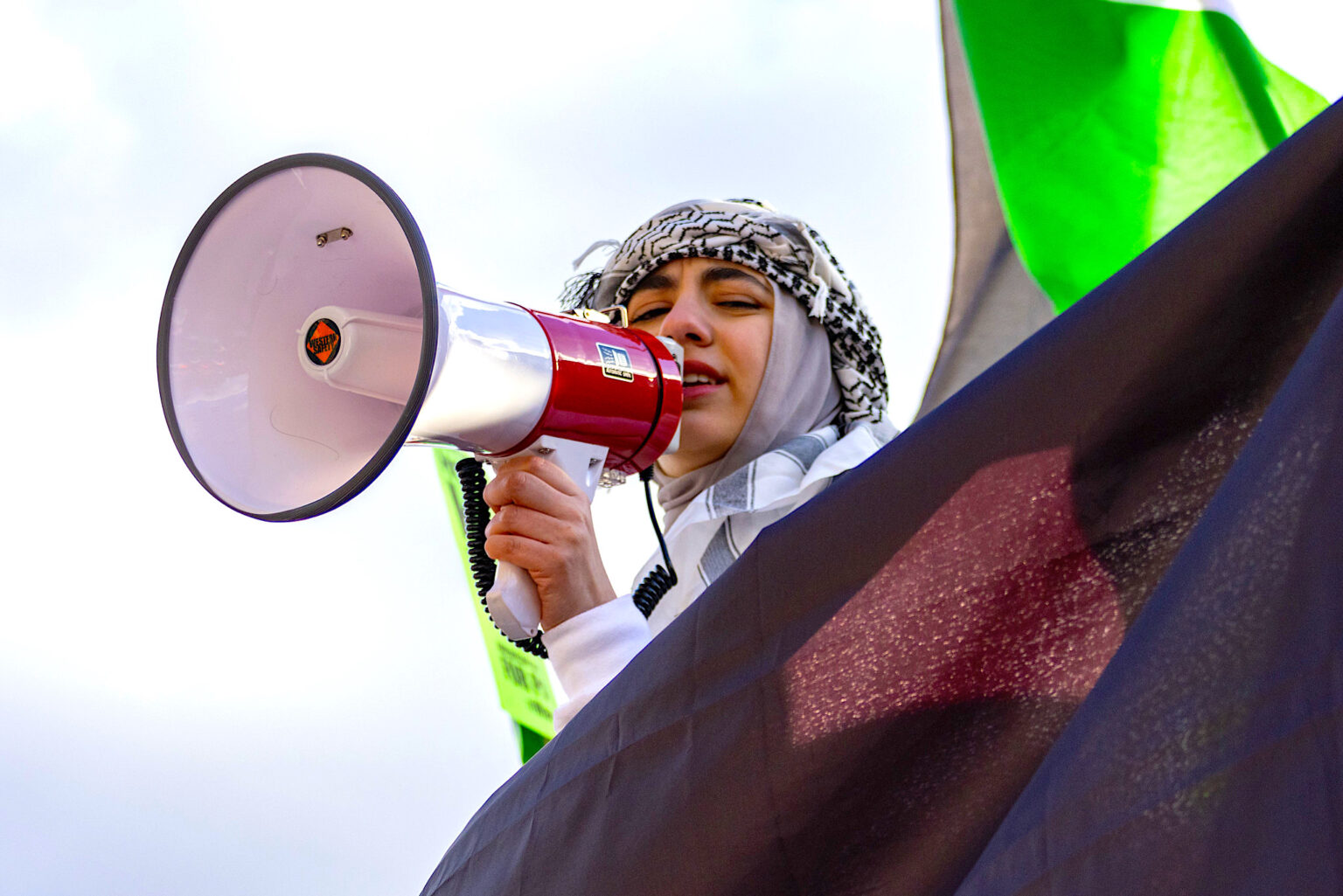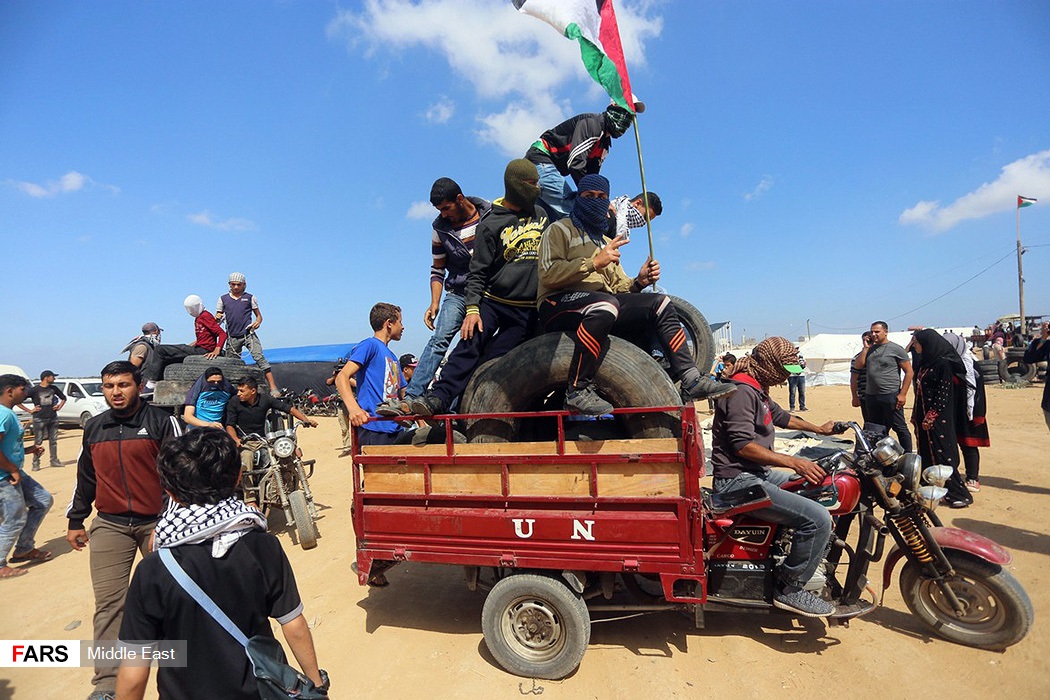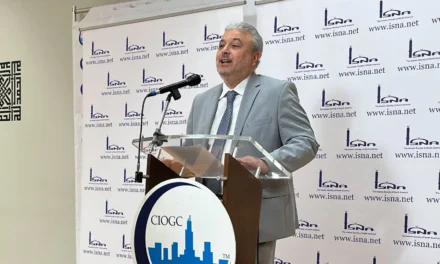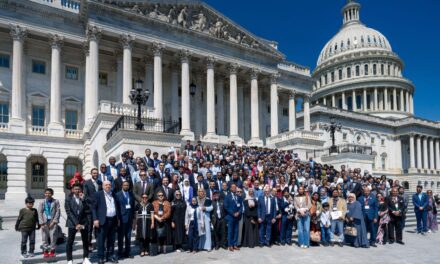Speaker at Washington, D.C., march on Washington for Gaza on Jan. 13. (Diane Krauthamer, Flickr, CC BY-NC-SA 2.0)
Free-speech defenders welcomed the U.S. Supreme Court’s refusal to take up a lawsuit that outlandishly claimed a civil society group provided “material support” for terrorism by advocating for Palestinian human rights.
The Supreme Court’s punting of Jewish National Fund v. U.S. Campaign for Palestinian Rights (USCPR)— which comes over three months into Israel’s war on the Gaza Strip — marks the third consecutive time a federal court has dismissed the case, which USCPR said casts “collective activism and expression of solidarity as unlawful.”
In the case’s first dismissal in March 2021, a federal judge said that the plaintiffs’ argument was “to say the least, not persuasive.”
USCPR Executive Director Ahmad Abuznaid hailed Monday’s move by the nation’s highest court, reiterating the group stands for “justice for all and an end to funding genocide.”
“There’s no lawsuit in the world that can stop us from pushing our demands for human rights,” he said. “We will remain focused on opposing Israel’s genocide of the Palestinian people and pursuing justice and freedom for the Palestinian people.”
According to USCPR:
“At issue were USCPR’s fiscal sponsorship of the Boycott National Committee and expressions of support for the rights and demands of Palestinians participating in the Great Return March [2108-19], when Palestinians protested to demand respect for their right to return to the villages from which Israeli settlers expelled them in 1948.”
Near Gaza’s border with Israel in 2018. (Fars News Agency via Wikimedia Commons,CC BY 4.0)
More than 230 Palestinians including at least 46 children were killed when Israeli forces responded to the largely peaceful demonstrations against Israel’s ethnic cleansing and illegal occupation with live and “less-lethal” ammunition.
Tens of thousands of Palestinians were wounded over the course of the protests, which continued for the better part of two years.
The Jewish National Fund (JNF) — which was established in 1901 to purchase land for Jewish settler colonists in Palestine, then part of the Ottoman Empire — claimed USCPR’s advocacy during the demonstrations violated a provision of the Antiterrorism and Effective Death Penalty Act of 1996, a highly contentious law signed by then-President Bill Clinton which prohibits “material support” for activities the United States considers terrorism.
“The JNF’s prolonged and egregious pursuit of a fishing expedition to silence and intimidate urgent advocacy for Palestinian rights has been definitively put to rest by the Supreme Court,” said Diala Shamas, a senior staff attorney at the Center for Constitutional Rights, which supported the defendants.
“The JNF’s accusations were baseless, as recognized by the district court, the court of appeals, and now confirmed by the Supreme Court,” Shamas added. “Now, as the government of Israel is carrying out an unfolding genocide against Palestinians in Gaza, it is more important than ever that activists be free to speak out without fear. This is an important victory, but USCPR shouldn’t have been subjected to these smears in the first place.”
According to Palestinian and United Nations officials, nearly 25,300 Palestinians have been killed and around 63,000 others wounded during Israel’s 108-day, U.S.-backed assault on Gaza in retaliation for the Hamas-led attacks of Oct. 7. Another 7,000 Gazans are missing and presumed dead and buried beneath rubble.
More than 1.9 million Palestinians, or over 85 percent of Gaza’s population, have been forcibly displaced, while medical officials say babies and children in Gaza are starving to death due to Israel’s self-described “complete siege” of the embattled enclave.
Israel’s conduct in the war is the subject of a South African-led genocide case before the International Court of Justice.















